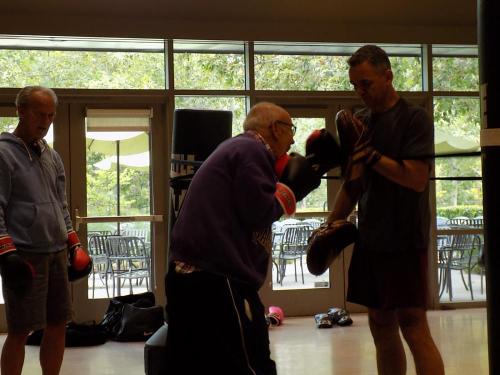
I recently spent time in California with my parents, girlfriend, children and friends. My parents at 89 and 85 are doing fairly well. (As you might recall my mother was hospitalized a number of months ago but has made a remarkable recovery). There is the usual array of doctor appointments but there are also a lot of social activities. While in California my friend’s father, Sam, turned 103 and we attended his birthday party. Sam is living in a board and care facility (assisted living/nursing home), which is a converted house with individual rooms for the 5-6 elders who live their full-time. Although Sam’s body is ageing his mind is sharp.
As people in the US live longer a multitude of problems develop including, for adult children, how to care for one’s parents. Along with an ageing body placing more limitations on a person and the mind not being what it was, Alzheimer’s has become a huge health issue. One in 10 people age 65 and older (10 percent) has Alzheimer's dementia. Almost two-thirds of Americans with Alzheimer's are women.
I’ve recently read the book When the Time Comes: Families with Aging Parents Share Their Struggles and Solutions and will also read A Bittersweet Season: Caring for Our Aging Parents--and Ourselves in order to help me understand what might be coming. Without great financial resources one’s ability to respond to helping ageing parents becomes much more limited. Do adult children bring ageing parents into their home? What about getting parents to doctor appointments? What happens when a parent develops Alzheimer’s; is it really possible to provide the care that they need and still live one’s life? Difficult questions but there are answers, at least in the US.
There are many resources for helping seniors. Hiring a Geriatric Care Manager to help a family has become an active profession. People acting as middlemen/women help elders to find the kind of care that is right for them. But what I’ve learned is that key is keeping parents in their homes for as long as possible.
Fortunately, in the US seniors can participate in a variety of activities offered at senior centers. These include everything from movies to games to classes, e.g. arts and crafts, dancing, to meals. My parents have been attending the Norman B. Murray Senior Center in Mission Viejo, California, a few miles from their home.
While visiting my parents I had the opportunity to watch my dad participate in a boxing class at the Center! Gary Ballard is a former professional boxer from South Africa who works with seniors to help counter Parkinson’s, Alzheimer’s and dementia. Although both of my grandfathers loved to watch boxing, I never would have thought that I would see my dad “throwing punches” at 89 years old. The class lasted one hour and included warm-ups, stretching and learning boxing basics. It seemed to be quite strenuous but enabled participating seniors to engage both physical and mental capabilities.
While living in Nepal I remember visiting the home for the elderly at Pashupatinath and thought that it was pretty abominable. It was as if the seniors were being cast off, not treated with respect and dignity. But hopefully organizations such as Saar Nepal, which I don’t know too much about, but has a robust website, can bring something like Senior Centers in the US to Nepal.
Maybe senior centers don’t exist as much in Nepal as in the US because elderly parents are expected to be taken care of by their children and other relatives. But how can adult children be expected to adequately take care of elderly parents experiencing dementia and other ailments?
In the US it takes a multi-level partnership between government, families, NGOs and the private sector to ensure that seniors age well. There is a social welfare safety net, guaranteeing a minimal level of care for those who are poor. This is led by the Government which hopefully can outlast those that might try to destroy it. In order to take care of elders in Nepal, and as families become nuclear, as people focus more on making money, ensuring that elders lead full lives will hopefully become a greater priority. Elders are a great resource and as long as they live they should be treated as such.










Add new comment